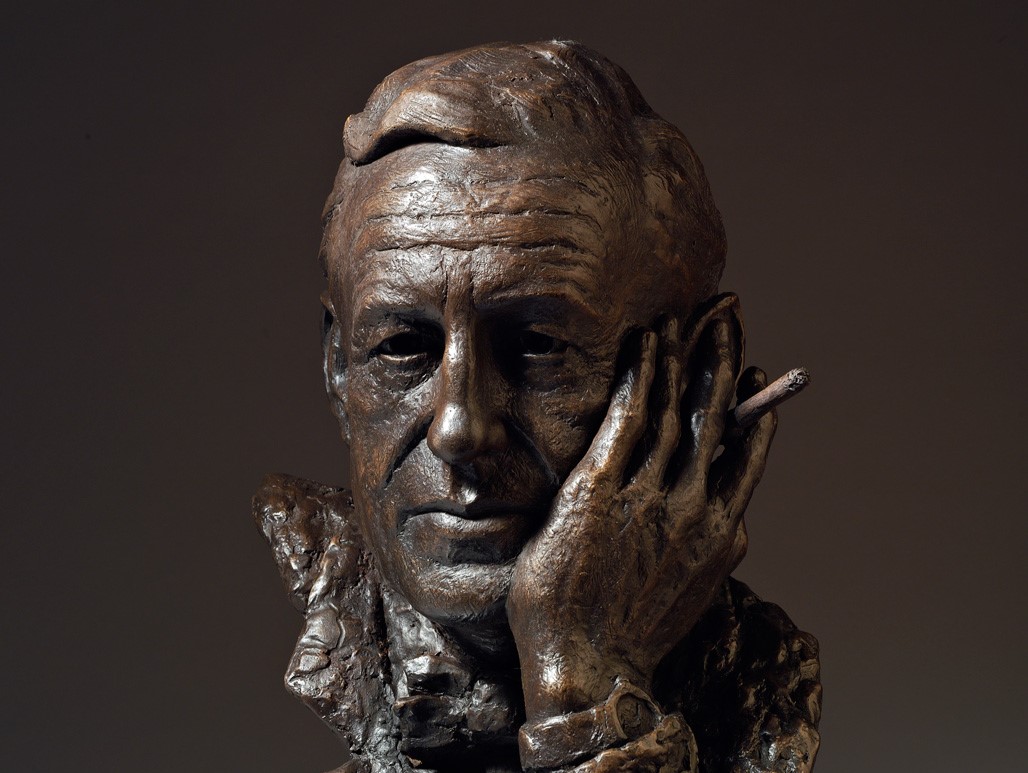Bronze bust of the author Ian Fleming by the British sculptor Anthony Smith. Commissioned by the Fleming family to commemorate the centenary of Ian Fleming’s birth in 2008. Photo by Fortheloveofknowledge at English Wikipedia / CC BY-SA 4.0 DEED. Cropped.
History is moving pretty quickly these days, and the heroes and villains keep on changing parts.” — Ian Fleming.
Ian Fleming’s James Bond novels, a series of spy stories that have captivated millions of readers worldwide, offer more than just thrilling espionage adventures. They also provide a fascinating lens through which to view Britain’s position in the world and its relationship with the U.S. during the mid-20th century.
Fleming and His Creation
Ian Fleming, born into a wealthy British family on May 28, 1908, had a diverse career before he started writing. He was a journalist, a banker, a stockbroker, and a high-ranking officer in British naval intelligence during World War II. His experiences, particularly his work in intelligence, greatly influenced the creation of his most famous character, James Bond.
James Bond, also known by his code number 007, is a British “Secret Service” officer who first appeared in Fleming’s 1953 novel Casino Royale. The Bond novels, set in a contemporary period during Fleming’s lifetime from 1951 to 1964, are packed with violent action, international espionage, clever spy gadgets, intrigue, and gorgeous women. They became international best sellers, with over 100 million copies sold worldwide.
The specific name “British Secret Intelligence Service” or “MI6” is not explicitly used in the books. This reflects Fleming’s own experiences in British naval intelligence during World War II, where he liaised with various sections of the government’s wartime administration, including the Secret Intelligence Service (SIS/MI6), the existence of which was not officially acknowledged by the British government until 1994.

Britain’s Position in the World
The Bond novels reflect Britain’s position in the world during the post-war era. In the aftermath of World War II, Britain was grappling with the loss of its empire and adjusting to its new role on the global stage. This transition is mirrored in the Bond novels, where Britain, despite no longer being a superpower, still plays a crucial role in global affairs through the actions of Bond.
For instance, in Casino Royale, the first Bond novel, the story line deals broadly with themes of Britain’s position in the world, especially with regards to British agent defections to the Soviet Union and the resultant deterioration in relations with the U.S. This reflects the real-world tensions and complexities of the Cold War era.
Anglo-American Relations
The Bond novels also delve into the dynamics of Anglo-American relations. During the mid-20th century, the “special relationship” between Britain and the U.S. was a significant aspect of global politics. This relationship, characterized by close cooperation in intelligence, military operations, nuclear technology, and cultural exchange, is a recurring theme in the Bond novels.
In the novels, Bond often collaborates with his American counterpart, Felix Leiter of the Central Intelligence Agency, reflecting the real-world intelligence cooperation between the two nations. Moreover, the novels often portray the U.S. as a powerful ally, echoing the shift in global power dynamics with the rise of the U.S. as a superpower.
Cinematic Evolution Reflecting Social Changes
The film adaptations of Ian Fleming’s James Bond novels have had a significant impact on Bond’s legacy, transforming the character from a literary creation into a global icon of popular culture.
The Bond films have successfully adapted to changing times, reflecting social changes, popular culture, and new technology. For instance, the first Bond movie, Dr. No (1962), introduced a secret agent with style, strength, and panache. The suave playboy of the early 1960s was evident in the way James Bond dressed and behaved in that first movie. The series evolved with the times, with each film reflecting the social and political climate of its era.
The Bond films have also had a significant impact on American culture. When Dr. No made its debut in the U.S. in 1963, it introduced the phrase “shaken, not stirred” into the American lexicon. However, it was not James Bond who said it first, but the villain, Dr. Julius No. Bond himself, played by Sean Connery, did not utter the phrase until the film Goldfinger (1964) This catchphrase has since become one of the most iconic lines associated with the James Bond franchise. The films have continued to influence American culture, reflecting important elements of the era, such as the sexual revolution and the jet age.
Bond’s enduring legacy can be attributed to many factors. The character of Bond was created by Fleming to be someone he wished he was and always wanted to be. The films have managed to capture this essence, making Bond a character that audiences worldwide can enjoy on many levels. The films offer a mix of action, sensuality, exotic locations, one-liners, and luxury, contributing to Bond’s enduring appeal.
Final Thoughts
Ian Fleming’s James Bond novels, while primarily works of fiction and entertainment, also serve as a reflection of the historical and political context of the mid-20th century. Through the thrilling adventures of Bond, readers gain insights into Britain’s changing role in the world and the complexities of Anglo-American relations during a pivotal period in history, as well as societal change during the period. These aspects add another layer of depth to Fleming’s work, making the Bond novels not just engaging spy stories, but also compelling historical narratives.
Resources
The Official James Bond 007 Website
007.com
The Official Website for Ian Fleming
IanFleming.com
*The views and opinions expressed on this website are solely those of the original authors and contributors. These views and opinions do not necessarily represent those of Spotter Up Magazine, the administrative staff, and/or any/all contributors to this site.
